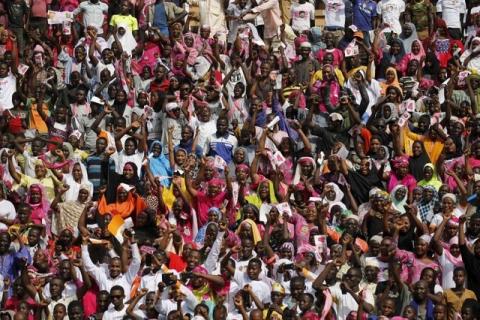Advertisement
Security, political tensions cloud Niger's presidential vote
NIAMEY (Reuters) - Niger will hold an election on Sunday in which President Mahamadou Issoufou is running for a new term with a vow to crush an Islamist militant threat, but the opposition accuses him of another type of crackdown - against them.
Issoufou has pledged to modernize security and defence forces in the West African state if voters grant him a second term, and develop gold and phosphate sites in a bid to improve living standards in one of the world's poorest countries.
Niger produces uranium and oil but is ranked last in the U.N.'s Human Development Index and has one of the world's highest fertility rates. Issoufou has also said he will promote family planning during his second term.
"We will beat them, our adversaries, and with a knock-out blow that will be a historical milestone, since it will be the first time that a candidate will win in the first round," Issoufou told a rally of up to 30,000 supporters on Thursday.
Issoufou faces 14 candidates, four of them members of an opposition coalition led by Seyni Oumaru, to lead a country that views itself as an island of stability amid neighbours such as Mali, Libya and Nigeria who are confronting Islamist militants.
Niger is not immune, however. Boko Haram, based in Nigeria, has been blamed for a series of suicide bombings and other attacks in recent months, forcing authorities to declare a state of emergency in the southeastern region of Diffa.
Critics say Issoufou has resorted to repression of political rivals, arresting opposition supporters for participating in unregistered protests over the arrest of one of their leaders, and banning a rally last November and in January.
In addition, one major opposition candidate, Hama Amadou, a former parliament head and one-time Issoufou ally, has spent the campaign in jail on charges related to a baby-trafficking ring.
He denies the charges and says they are politically motivated. The government says it respects the rule of law.
In another sign of increased tension, anti-riot forces are stationed at intersections in the capital Niamey and conduct night patrols in the wake of what the government said was a coup attempt in December.
CAMPAIGN POSTERS
The walls of streets in the capital Niamey are plastered with photographs, pennants and banners of the candidates, but municipal authorities, citing security concerns, have banned the parades of cars common on the campaign trail.
Hamadou Saley, an opposition supporter, said Niger has no history of electoral violence. "We can protest peacefully to show our disapproval but things can only degenerate if authorities unjustly employ brutal force," said Saley.
Issoufou, who was born in 1951, won an election in 2011, a year after a coup. Under election rules, a run-off will be held if no candidate secures an outright victory on Sunday, and opposition leaders acknowledge they face an uphill struggle.
Issoufou's challengers include Amadou, 2011 second-place finisher Oumaru and ex-president Mahamane Ousmane. An opposition bloc has been formed to block Issoufou from winning in a second round by supporting his opponent and guarding against fraud.
Around 5,200 candidates will vie for 171 legislative seats on the same day as the presidential race.
Jean-Herve Jezequel, an analyst on the Sahel for the International Crisis Group, said enthusiasm has dimmed for Issoufou had dimmed since he first won election as a long-term opposition leader. "The hope on which he was elected in 2011 ... I don't see anymore," said Jezequel.
(Additional reporting by Joe Penney in Niamey; Editing by Matthew Mpoke Bigg and Mark Heinrich)



















Add new comment